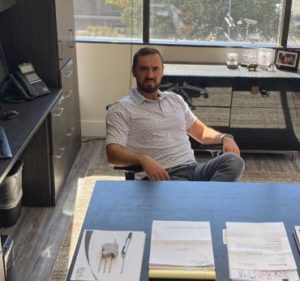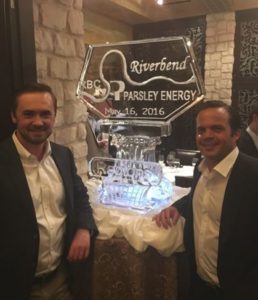“He has a nose for deals.” —T. Ackerman
“He is very focused.” —B. Sheffield
“He has an unlimited future.” —A. Stephens
“I worked my butt off.” —T. Newkumet
These are some of the ways industry leaders—including the man himself—describe Regions Permian Co-Founder and CEO Travis Newkumet. Leaders like Tomas Ackerman, partner at Carnelian Energy Capital; Bryan Sheffield, Partner at Formentera Energy Partners and Chairman of the Board for Parsley Energy; and Autry Stephens, Founder and General Partner of Endeavor Energy Resources.
Hard work, persistence, and no fear of hearing the word “no” are traits that have served Newkumet well, lifting him from occupying a free Fort Worth office in 2013 to leading a multimillion dollar oil company just eight years later. The FortWorth office was rent-free because, as Newkumet says, at the time he “didn’t have any money to pay for it.”
Not So Fast

Travis Newkumet
As happens with many who grow up in the oil business in Midland, as Newkumet did, there was a time when he wanted to branch out. His father, Wayne Newkumet, founded Newkumet Exploration in 1983. For a while, in high school and college, the younger Newkumet had little interest in oil and gas. As he recalls today, “The oil business, frankly, bored me. I certainly was exposed to it at a very young age. I remember my dad would take me up to his office and show me his maps and everything he was working on.”
Upon leaving for college, the younger Newkumet’s goal was to “see what else was out there.” He thought about becoming an energy industry investment banker due to a love for numbers and finance. Accordingly, at SMU he graduated with a double major in Finance and Economics in 2010.
The Turning Point
By his senior year, however, the shine was coming off the banking goal. During the year, he interviewed with CitiBank for a postgraduate job. Because he seemed listless during the procedure, the interviewer asked him, “Do you really want this job?” Newkumet said, “I thought about the question and said, ‘You know, ma’am, I appreciate your asking me and I really don’t.’” They parted on good terms.
After that, “I made a phone call and became a landman.”
The degree was far from a mistake, Newkumet said, because that training helps him evaluate oil and gas investments to this day.
That first job was for a land brokerage firm called Dale Property services. It piqued his interest in returning to his oil and gas roots, while teaching him more about the workings of the business. He learned, “how these companies go out and drill these big wells, and how you can buy interest in those wells, and then with the leases, they make money by selling them to operators.” How to make money investing in the oil business was his biggest takeaway, foundational in starting his own company about a year later.
He entered this new phase with a clear purpose. “I always wanted to provide for myself, and not necessarily get a paycheck. I wanted to create opportunities on my own, and I did that pretty early.” He was 22 when he started Regions Permian.
“I didn’t have any financial backing,” he continued. “I brokered oil and gas prospects. I worked my butt off trying to figure out what people wanted to buy, and then I went out there and looked for opportunities. I started with the endgame in mind: This is the prospect I need to own… What does the market want? And I backed in from there. I turned over thousands of stones and a few of them worked out. I brokered a few deals and got paid commissions. That’s what gave me enough money to get going.”
His first significant deal arose from one of those thousands of stones. In 2012 an acquaintance told Newkumet about a Bakken deal he’d learned of. Newkumet, in turn, knew of Dallas company looking for Bakken assets. As yet largely unacquainted with the Bakken, he still decided to “swing for the fences, a $30 million deal.”
He called the Dallas firm offering to broker a deal for a one percent commission. After signing a simple one-page contract, Newkumet and his buddy got the deal done, splitting the commission.
This kind of simplicity is not the norm. Sometimes, “you get burned. You just have to be persistent. You have to not be afraid of hearing the word No.”
A few months after that, he assembled a lease in Kansas, with help from a backer. Later that same week he flipped the deal to a mid-major and split a $200,000 profit.
Home Work
Not everybody works this hard, but Newkumet credits his parents for teaching him this work ethic. “I was never given any handouts. I had to mow the lawn, I had to pick up pecans in the whole yard—about an acre. My dad paid me $10 to pick up all the pecans.” Paid might not be the right word. “They took me to the pecan orchard and I sold the bag of pecans for $10.”
From those early lessons he realized, “I really never wanted to be stuck at a company just getting a paycheck. I wanted my own freedom.”
The Beginning of Freedom
Newkumet’s early deals were limited by the fact that he was using his own money to accrue assets, without other investors. Deep research revealed strong plays where he could aggregate assets, packaging them for resale to a larger E&P. But all those deals were relatively small, located primarily in Oklahoma and in the area of his newfound expertise, North Dakota.
A large Reagan County project was a turning point. “In 2013 I sold my first big deal,” he said, acknowledging that it took some creative planning. “I actually didn’t have enough money to buy that one. But the buyer did a simultaneous closing so they paid me and I paid the seller.” A seven-figure profit on this transaction catapulted the young entrepreneur into the big leagues.
Now he could turn his thoughts homeward, toward deals in the Permian. He also began taking some investment money, allowing him to create even bigger opportunities. But those bigger returns never went to his head.
Ackerman spoke of participating in a particularly large deal of assembling acreage, which sold for an amazingly large return. “He nonchalantly called and said, ‘We’ve got an offer for basically two times our money,’ and said it super matter-of-factly. In our business, two times your money in a very quick time frame, that’s a deal you’re really excited about and high-fiving about.”

Travis Newkumet left and Bryan Sheffield, right, celebrating a big victory.
Newkumet has a great network, said Ackerman, who also remarked that Newkumet has nose for deals along with a penchant for honesty and trustworthiness.
“Even keel” is another phrase connected with Newkumet, in good or bad times. Sheffield said he is “Always a cool customer” in deals they did together. “He didn’t get flustered, didn’t get mad. He always maintained the same level. Nothing rattled him.”
Specifically, Sheffield said sometimes there can be hidden title issues that only appear late in the deal process. Some in the business get worried, flustered, or worse when these things arise. Not Newkumet. “If there were any title problems, which can occur, he cleaned it up or he made it good,”
Sheffield said. “He learned from his father, like I learned from my father and my grandfather, that your word is your bond.” In the close-knit Permian Basin, a good name is everything.
Pivoting
Today’s investment markets have changed, and most of the good deals are done in the Permian. This has led Regions Permian to shift gears from just packaging and selling to operating—to a point. “We pivoted to non-op working interests,” he said. “It’s really all driven from Wall Street. They’ve required these companies [E&Ps] to perform and stop buying assets and showing inventory, and actually drill good wells. So that acreage-flipping game came to a halt. Not to mention, all the acreage was already acquired. We had to change our model.”
Further, “I realized that now that all these wells are getting drilled, it’s time get into those wells, and start investing in the wells themselves as opposed to just investing in the land.”
But he noted that Regions Permian still looks for an exit, an opportunity to sell. There are just fewer of those these days. They mainly operate due to HBP (held by production) agreements.
Recipe for Success
How does one build a business like Regions Permian in such a short time?
“Hard work is number one. Also, being exposed to good people that have a desire to help me. Midland is a unique community. There are a lot of people willing to help you get going. I attribute a lot to that.”
He added, “A big part of success is in loving what you do, and I really love what I do. It’s a great community, good people, honest people, and it’s an overall good place to be.”
He counts Sheffield and Stephens particularly as mentors. Sheffield recalls early meetings after he’d met Newkumet through an Autry Stephens introduction. “He asked a lot of questions. He asked more questions. We’d go to lunch every few months and he’d ask more questions—about the business. It’s not like we were talking about sports. We just talked about courthouses and picking up leases.”
Passing that legacy on is important for Newkumet as well. One of his biggest delights is in “Helping other people gain their own success. I enjoy employing people that bring a lot of value to the organization, seeing them do well.” Before the pandemic, the company employed 15 people, a count that has shrunk to five.
Over the next few years he plans to focus on local education-related philanthropy in addition working the business. Law enforcement is another area of philanthropic interest.
Stephens summed up Travis Newkumet as follows: “Travis has been amazingly successful in a short period of time. Looking from the outside, he has made it look easy to succeed in the oil and gas business. I’m convinced he has an unlimited future.”
Paul Wiseman is a freelance writer. His email address is fittoprint414@gmail.com.










